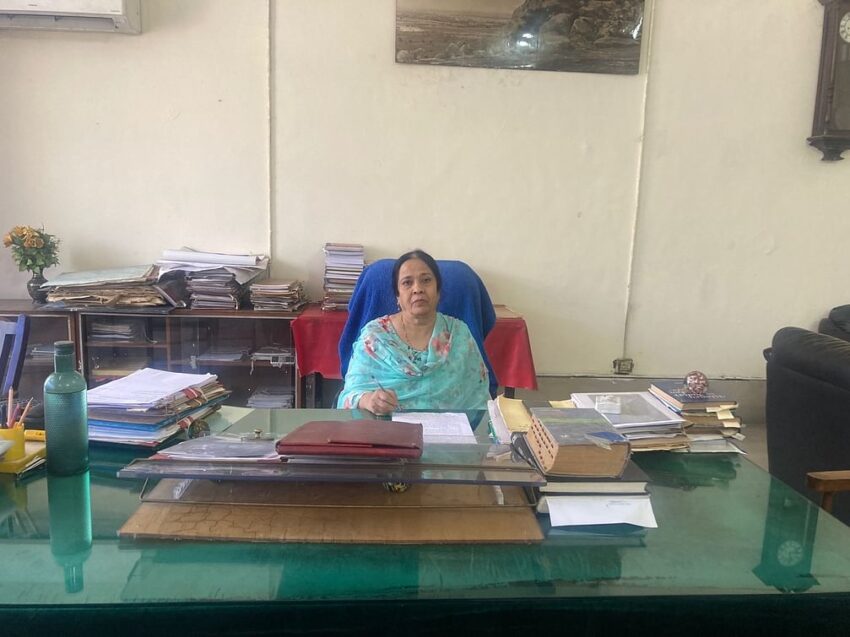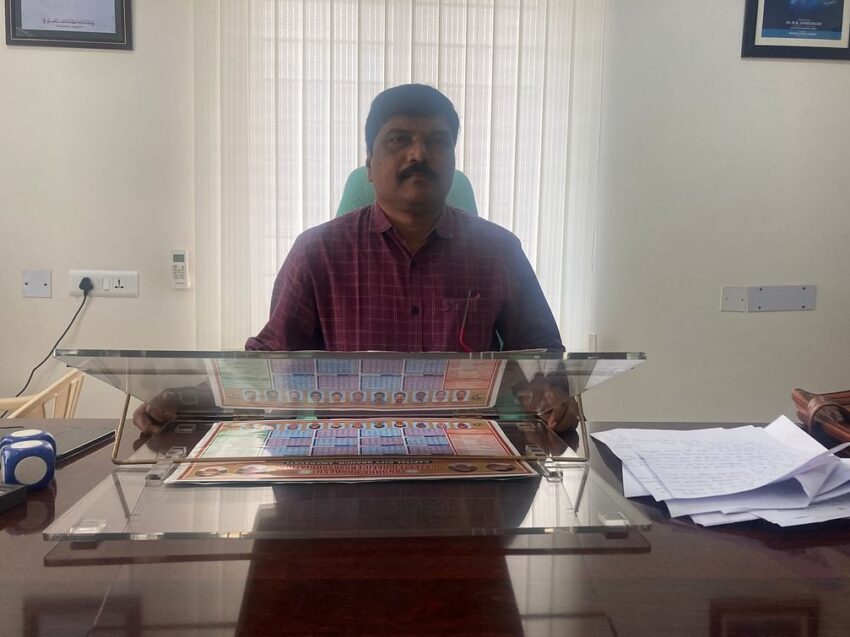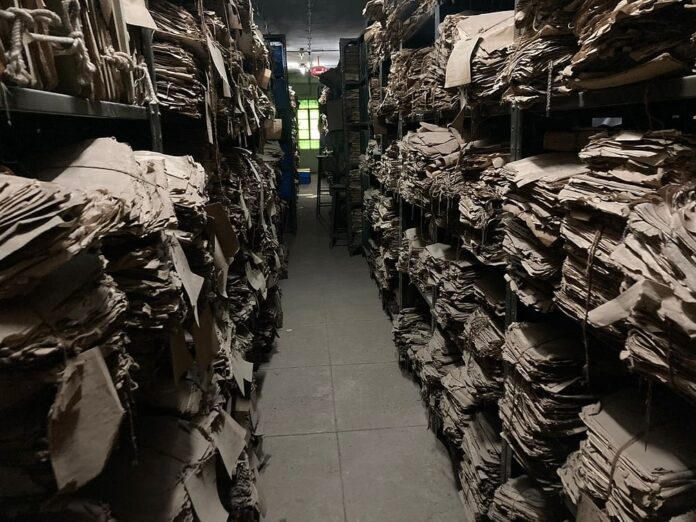Post bifurcation, the fight is on between Telangana and Andhra Pradesh archives department to calculate tge deposits of history. The point of dispute is the little period of time that existed between the accession of the state of Hyderabad to India and the founding of the state of Andhra Pradesh.
The Telangana State Archives and the Andhra Pradesh State Archives are the two claimants to history. Ten years ago, the state of Andhra Pradesh was divided in half. But it’s been more difficult to divide the history of the area into two indisputable halves.
Each state is tugging at the frail papers of the past in this tug-of-war.
The key question in this conflict is “Whose history? “.
The Telangana State Archives’ walls are falling down just like the records they store. Water drips into a bucket outside the director’s office from a broken pipe. In filthy, dim, claustrophobic quarters, tattered records written in Persian and Urdu date back centuries. The director of the Andhra Pradesh State Archives is located 300 kilometres away, beyond state lines, in a brand-new, largely vacant structure. Rooms that he hasn’t yet filled surround his brand-new office. He is awaiting the delivery of the Telangana archival documents, which the state will not give up.

And what’s at stake is Hyderabad’s modern past
They are at odds over government decrees and land records from the Nizam’s regime between 1948 and 1956, which constitute the basis of the dispute the foundation of the erstwhile city that was once Andhra Pradesh’s capital. The bone of contention is the brief overlap between when the state of Hyderabad acceded to India and when the state of Andhra Pradesh was created. And both Andhra Pradesh and Telangana have staked their claims on these records.
However, it’s not just about the past. It is about language, religion, and the cultural identity of two strongly proud traditions, as exemplified by V. Ranga Raj and Zareena Parveen, the directors of both archives. In an Andhra Pradesh without the divide, the two were close coworkers, but after the split in 2014, they have been thrown into separate corners and are fighting over the day’s leftovers.
The director of the Telangana State Archives, Zareena Parveen, claims that the division was amicable and legally correct. “How can I divide the archives in half, though? Their past is not the issue. It belongs to us. It is about Hyderabad and the Deccan’s history.
Expert committees were formed, records were organised by kind, a transfer list was created, and agreements were made. The two directors signed a memorandum of understanding in 2018 that promised “mutual cooperation.” Even the vehicles used to transport the documents from Hyderabad, Telangana, to their new storage in Mangalagiri, Andhra Pradesh, for seven of the twelve kinds of records that were agreed upon.
Even so, ten years later, the two states still haven’t been able to completely separate their past not to mention not deciding what belongs to whom.
- What the archives are fighting over
The period between 1948 and 1956 — when the last Nizam of Hyderabad, Mir Osman Ali Khan, ruled — is what’s contested.
- What the archivists are arguing about
What is in dispute is the time frame of 1948–1956, when Mir Osman Ali Khan, the last Nizam of Hyderabad, governed.
It was typical for farmans (an order or directive) from the Nizam’s government to come with several copies, as was the case with land records during this time period. Telangana is still allowed to keep these originals, and Andhra Pradesh is allowed to have their digitised copy. According to Andhra Pradesh, they need to have them as well—if not the originals, then at least the earliest copies.
The Telangana archives hold significant records from periods like the Mughal era and the regimes of the Nizam. Documents from a Muslim independence warrior determined to prevent the division of India are two examples, as are farmans like those Nizam sanctioned Rs 1 lakh to Banaras Hindu University in 1939, or an 1876 order banning sati practice in Hyderabad state.
According to Parveen, a distinguished and experienced scholar of both languages who has written extensively on the archives’ Urdu and Persian records, “all these documents are in Urdu or Persian anyway.” “Language experts are present. She said, alluding to Andhra’s use of Telugu and the Telugu alphabet, that they wouldn’t be very useful there.
“Our archive is a treasure trove. People are unaware of the khazana (treasure) that is located here, Parveen stated, lifting her eyebrows. Her Andhra Pradesh colleague, who has worked at the same archive as her for decades, is undoubtedly aware of this.
The private correspondence of a guy whose plot was nominated for a Golden Globe is the crown jewel of the Andhra Pradesh State Archives. The Andhra Pradesh State Archives rightfully have the journals and correspondence of revolutionary Alluri Sitarama Raju, on whom the historical drama RRR was based. Telangana is not making any efforts to keep them. This is due to the fact that they are Telugu-speaking, primarily contained inside one of Andhra Pradesh’s 13 districts, and do not cross over into any of Telangana’s 10 districts.

V. Ranga Raj spreads his hands and leans back in his leather chair, saying, “It’s public property.” “We used to work well together, but now there are conflicts. Therefore, it was challenging when bifurcation occurred. Because they have our records, we got dependent on them.
There isn’t a model.
But the fact that Andhra Pradesh now has its own archive is unusual.
Other reorganised states’ state archives, like those in Bihar, Jharkhand, Madhya Pradesh, and Chhattisgarh, have not engaged in this conflict.
Suman Kumar, the director-in-charge of the Bihar State Archives, stated that Bihar preserves all the documents because it is the parent state of both Bihar and Jharkhand. Hyderabad, the former capital of the former parent state Andhra Pradesh, is now the capital of the new state Telangana, which further confuses the situation. Hence the conflict over the papers.
One of the few Indian states, Bihar, passed the Public Records Act in 2014, which prohibits the transfer of any public records from its repository. The Jharkhand government or researchers can access records in Patna, according to Kumar, who drew attention to the challenges of moving fragile documents. Ranchi had a university before the state was split, as well a regional record office. This office has retained its records and is now Jharkhand’s official archive.
In both Madhya Pradesh and Chhattisgarh, the situation is similar. The originals have all remained in Bhopal, according to Kadam Singh Mena, a member of the Madhya Pradesh State Archives staff, while duplicates have been transported to Raipur. In response to repeated complaints of missing documents, the Madhya Pradesh State Information Commissioner Rahul Singh allegedly advocated for the introduction of state legislation to protect public information.
According to archivists, a part of the problem is that the newer states, which were created by splitting off from their parent state, are not demanding documents for their own archives.
The course that Andhra Pradesh and Telangana choose could serve as a model for future regional confrontations over the past.
The chasm in culture
One of the main causes of Andhra Pradesh’s breakup in 2014 was an intense sense of bitterness. People from Telangana believed that residents of Andhra Pradesh were abusing the state’s resources and enjoying supremacy over it.
The history of the area is currently jointly maintained by Parveen and Ranga Raj. They are determining who gets which history and whose history is a priority to them based on the protracted demands of the state division. One views it as Telugu history, while the other sees it as Deccan history.
In 2015, the hot issue of who will take Parveen’s place as director of the Telangana State Archives arose of bifurcation dictated the decision. Next in line was her deputy director, Ranga Raj — a man from Andhra Pradesh.
He was not given the promotion. Parveen remained at her position. And the choice left a rift that hasn’t yet mended. She used to be subordinated to the person who now places his own demands on her and even refers to her as “Akka” (older sister).
When the archives were formally separated in 2018, Ranga Raj received his due. He relocated to Mangalagiri and assumed management of the five-story structure that presently serves as home to four additional Andhra Pradesh government offices. The first tenants of the building were the archives, who have exclusive use of two levels. The structure is located in a town that doesn’t seem to be the home of any significant governmental offices and is surrounded by vast fields.
It’s a far cry from the outdated Telangana archive building in Hyderabad’s Tarnaka, which is leased for 99 years Osmania University.
Ranga Raj estimates that he makes a trip to his former employment every three months. He last came in the beginning of December 2022. He travels to visit his former coworkers and acquaintances and supervise the transfer of the remaining records. He remarked that in order for the transfer process to proceed successfully, he must continue to have good ties with them. After the transfer is finished, he will categorise everything and assess the state of the records.
The work will continue regardless of the Andhra-Telangana tensions, according to Mohd. Abdul Raqeeb, assistant director of the Telangana State Archives. He gets along well with Ranga Raj, and they communicate frequently. Raqeeb is more heavily involved in the transfer’s daily operations, and keeps tabs on its progress. All documents after 1956 — officially common property between the two states — need to be copied and sent to Andhra. The process hasn’t begun yet because neither state has the budget for it.
Telangana and Andhra Pradesh made the decision to divide all of their assets in a 52:48 ratio. However, the directors are finding it difficult to adapt this to the region’s oral history. Furthermore, they believe that this is still unfair. Ranga Raj argues that he is entitled to more records, but Telangana was only given one regional office, but the new state of Andhra Pradesh has five, located in Tirupati, Anantapur, Vijayawada, Rajahmundry, and Visakhapatnam. One of the reasons Parveen is fighting so hard to preserve what is in Hyderabad is because of this.
The workforce at the archives was divided in half, 58:42, just like every other resource owned by the state.
180 jobs were authorised for the archives, 104 of which went to Andhra Pradesh and 76 to retained by Telangana. The Andhra Pradesh Archives currently has only 11 permanent staff, of which only four are in Mangalagiri, and the remaining seven are posted across different regional centres. The Telangana Archives currently has 36 permanent members of staff.
Funding is another problem. The Telangana government approved Rs 1 crore in February 2022 for the digitization of records. Additionally, the Archives and the Government of Iran recently signed a Memorandum of Understanding (MoU) to bind and preserve historic papers and digitise microfilm.
Parveen, who is viewed by her workers as being synonymous with the organisation she leads, stated, “Telangana is our state; we can’t betray it.” The Andhra state departed. Why must it take our history when it hasn’t left its behind?
The history of the archives has been convoluted. They’re hard to separate today because they’re a jumble of many distinct archives. The Mughals established their own archives in the area, which became known as the Daftar-i-Diwani, and ruled the Deccan from Aurangabad. Then, in an effort to organise them linguistically, all Telugu language records were moved from the Madras Presidency’s colonial archive to Kurnool. In 1950, the Central Record Office was established by the Nizam of Hyderabad, combining these two archives. After the creation of Andhra Pradesh in 1956, it changed its name to the Andhra Pradesh State Archives. Only four years after the bifurcation’s completion, in 2018, were the records formally divided.
Here, Telugu pride history is interacting with Telangana history and, before, Madras presidency history. Separating the two is not only a bureaucratic exercise for two officials; it is also a highly emotional endeavour for the citizens of both states.
Ranga Raj stated that about 50–60% of the documentation for the Andhra region have been moved here (to Mangalagiri). He claims that Andhra Pradesh alone is the rightful owner of every document that was transferred from the Madras Presidency and every record from 1956 to 2018.
Parveen would be opposed.
She said that the years 1948 to 1956 should be included in the history of Telangana, and the original records from those years should remain in Telangana because these documents were the property of the Hyderabad Central Records Office.
Documents pertaining to land, which make up the majority of this contentious property, are of interest to more than just academics and researchers. They are also sought out by activists or ordinary people who want to settle disagreements, look into the background of assertions, or support their claims. Even government organisations, like the Waqf Board, are curious; they frequently visit the archives in search of records that would have designated a specific piece of property as waqf (endowment made to a charitable, educational or religious cause).
Furthermore, this time frame encompasses the period when Hyderabad was placed under military rule. After Hyderabad was formally incorporated into the Indian Union in 1948, Major General JN Chowdhury was chosen to serve as the state’s military governor. Operation Polo was directed by Chowdhury, who held this position up until 1949. Mir Osman Ali Khan, the last Nizam, headed the state as Rajpramukh from 1949 to 1956.
It’s especially relevant in modern Hyderabad, a historical city that’s been developing fast into a technological and infrastructural hub in India. There were fears about the bifurcation dulling Hyderabad’s shine. Instead, the past decade has seen it become one of India’s most expensive residential markets, with global giants like IKEA and Lockheed Martin choosing the city as their base.
Issues with infrastructure
Ranga Raj has that rare opportunity most archivists dream of – building an archive from scratch in the way he wants.
The Andhra Pradesh State Archives are ready to fling open its doors — to scholars and records alike.
It’s no surprise that its director is trying to invigorate the archives and set a new standard in stone. The records that have made their way to Mangalagiri are all neatly organised and stacked, with the more delicate and brittle records preserved in anti-acid boxes or between wooden planks.
The repository’s rooms are divided by district and type of record. Papers from the current Andhra Pradesh administration have already started arriving, dumped in one big room and sorted in real time. There are no reading rooms yet, and scholars are yet to arrive at the new, remote location. Only two foreign scholars have reached out to the archive since 2018 to enquire about records, while a few from nearby universities have visited.
Ranga Raj even prepared legislation to preserve public records, which he hopes will be introduced in the Andhra Pradesh assembly in February 2023 by education minister Botsa Satyanarayana. He has not shared a copy of this law with his counterparts in Telangana — it’s his hard work, after all.
He has contracted staff to come work with him. They are all college graduates but not specially trained in preserving records. Ranga Raj and the more senior members of staff try to provide them with training every three months. Across state borders, the staff in Telangana are languishing — many of those left working there have been there for decades and have only seen their workplace descend into more and more chaos.
“Because of the bifurcation, the staff has also gone,” said B. Eswara Rao, associate professor at Hyderabad Central University who was using the Telangana archive to access public health records. “And the people working here don’t know about record-keeping. There are no proper facilities to sit and read also.”
The staff and scholars both agree that the archives are not a priority for the state government — both in Andhra Pradesh and Telangana. It’s because the archives are a service-oriented department that does not generate revenue, according to Ranga Raj. Staff are contracted at both archives and have been so for years. The measly three-member team that looks after Persian records at the Telangana archives still doesn’t have permanent jobs, despite being part of a dwindling number of experts who can handle such documents.
Scholars have noticed this too. Indivar Jonnalagadda, PhD scholar at the University of Pennsylvania working on the intersecting politics of citizenship and property in Hyderabad, remembers a staff member telling him that “while the two states were vying for items in the collections and archives, neither state was taking ownership of the institution or the infrastructure.
So bifurcation only aggravated the situation of the archives, which was one of resource and staff scarcity.” He added that it’s not clear to him what value contemporary governments give to archives. “From a right to information and a scholarship perspective, I think the greatest need of the archives is investment into infrastructure and staff and continuing collections. I don’t think that is on any government’s agenda,” Jonnalagadda said.
There have also been allegations of bureaucrats and businessmen stealing papers to forge or use to their own benefit — the archives are rife with rumours.
Rajan Das, building superintendent of the Telangana State Archives, acknowledged these rumours, but said that it’s not something they have the capacity to address right now. “Dust is our biggest enemy!” he said, staring wistfully out his large window framed with peeling plaster and water-stained walls. “It’s a tough task. We don’t have the technology or the knowledgeable staff to properly maintain our records. In the meantime, we have to make sure this building is up and running.”
He has two permanent staff members who work with him. In mid-December last year, a portion of the ceiling in the Persian record room fell down. The tables with open, exposed records had to be hurriedly rearranged, and the dust was neatly swept to the side. The staff are used to making do. During the monsoons, rain floods the ground-floor rooms, and water seeps into the damp walls.
Curiosity and comparison
Both archives are understaffed and underfunded. Both are run by former friends committed to the purpose of preservation.
And everything in the archives — from the records to the staff — is caught between them. “Andhra Pradesh and Telangana are like siblings. But sometimes working here is like working between India and Pakistan,” jokes one staff member in Hyderabad.
The new office led by their former deputy director is the talk of Hyderabad. They had all heard how posh and contemporary it is, despite being out in the wilderness. Less about how the archives are being arranged and preserved, and more about the size of Ranga Raj’s office or the funding he has received, are the jealous questions they pose. A staff member inquired about the amount of rent due for the archives’ two floors.
However, despite the interest, no one from Hyderabad has ever travelled to Mangalagiri. The two archives behave as though they are centuries apart despite the short five-hour drive.
Parveen and the Telangana State Archives have been invited by Ranga Raj and the Andhra Pradesh State Archives multiple times to come and visit. But they’ve never visited. Her work, Parveen says, is to hold the fort in Hyderabad. #hydnews #khabarlive #hydlive







